
Bring Down the Noise
Whether you own a shop, work in a production facility, or do work at home — you can't work comfortably in a noisy environment for very long. If you run a business, you definitely don't want your customers exposed to a loud compressor, and higher noise levels could jeopardize the safety of workers.
In this article, we explain loudness and show you what to look for when shopping for a quiet air compressor.
Measuring Loudness in a Decibel Chart
When shopping for a quiet air compressor, you'll notice all kinds of terms being used like: 'ultra-quiet,' 'noise-less,' and even 'silent,' but what do they all really mean? It’s easier to understand how loud or quiet something is when it’s compared to things found in our everyday surroundings. To give you an idea, take a look at the noise level decibel chart below:
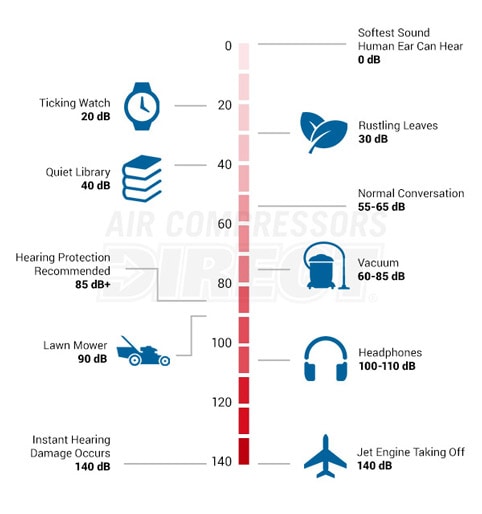
Why Are Compressors So Loud?
Noise levels of air compressors today range, on average, between 40 and 92 decibels, which is quite a large gap. How can one air compressor be about half as loud as a conversation, and another one be downright deafening? It has to do with a couple of different factors.
1. Friction
Some types of compressors, such as reciprocating compressors, have more moving parts that 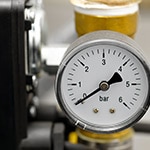 make contact with one another and cause a great deal of friction. Other compressors, like scroll or rotary screw compressors, have as little as one moving part in the entire machine and are, by design, nearly silent.
make contact with one another and cause a great deal of friction. Other compressors, like scroll or rotary screw compressors, have as little as one moving part in the entire machine and are, by design, nearly silent.
Friction also plays a crucial role depending on the size and capacity of the machine. Almost all inflators are extremely noisy because they have zero capacity and are very compact. For example, to get the amount of pressure it takes to fill a truck tire, the tiny piston inside that inflator has to move like crazy (high RPM) and, therefore, generates a lot of noise and heat in the process.
Generally, quieter, higher-quality air compressors are more expensive than their less expensive counterparts.
2. Power Source
Another factor that affects the decibel output is the compressor's source of power. Quieter compressors are undoubtedly electric-powered, whereas gas-powered compressors will inevitably produce more noise because they employ an engine to produce the power to compress the air.
3. Proximity
The closer you are to the air compressor, the louder it will be. In some situations, such as in a 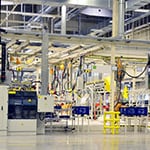 dental office, a noisy compressor may be unacceptable. If you want to eliminate noise exposure altogether, one of the best alternatives is to relocate the compressor further away from your workspace.
dental office, a noisy compressor may be unacceptable. If you want to eliminate noise exposure altogether, one of the best alternatives is to relocate the compressor further away from your workspace.
If you have the room, compressed air piping systems are perfect for relocating the compressor and allow flexibility to fit every need.
Qualities that Make a Compressor Quieter
When sourcing your next air compressor, it’s good to know the sound levels that require hearing protection as well as noise levels that can cause immediate and permanent hearing loss. This is called noise-induced hearing loss (NIHL).
Many users do not realize that even being exposed to noise levels around 80 decibels, like a loud vacuum, for extended periods of time can also result in hearing loss over time. This is especially relevant for jobs where the worker is close to the air compressor or machinery.
Although there isn’t a standard for labeling the noise level of every air compressor, more and more people and industries are looking for quieter compressors. Here's a list of qualities that will help you know what to look for in a quiet air compressor:
Sound Dampening
.jpg)
Look at the pump on most compressors, and you'll notice it's totally exposed, resulting in an unrestricted blast of noise to your ears. Many consumer and professional-grade air compressors are now being manufactured using thicker gauge steel or aluminum, with some companies installing a sound-dampening enclosure right over the motor, pump, and fan, like this two-stage compressor from BelAire.
Quiet compressors also utilize strategically placed dampening pads to reduce the amount of vibration and contain the sound waves produced by the compressor.
Rubber Components
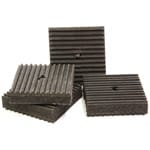
Vibrations that are emitted from the compressor may actually have an amplifying effect and cause the compressor to become louder than it actually is. To help solve this, rubber isolation pads are great for keeping vibrations from reaching the floor.
By implementing rubber pads and other sound-dampening techniques, air compressors can now produce less than 70 decibels of sound. That's slightly more than a common one-on-one conversation, which is pretty easy on the ears.
That's a great improvement from 90 dB, which would be enough to permanently damage your hearing.
Oiled vs Oil-free
We hear this all the time: "I don't want an oil-free compressor because they're too noisy!"
Well, that may be true, at least for entry-level reciprocating air compressors, but contrary to popular belief, there are air compressors that are very quiet AND oil-free, too. More and more manufacturers are developing new technologies for the medical, dental, and food industries that require clean, quiet, and oil-free air compressors.
Examples of these compressors are a rotary screw, scroll, or reciprocating pump that features a dual-piston design.
Air Compressor Types
It's true that electric-powered air compressors are quieter than ones that run on gas, but that still leaves a huge number of compressors from which to choose. So, the next step is determining the type that fits your needs.
Reciprocating (Piston)
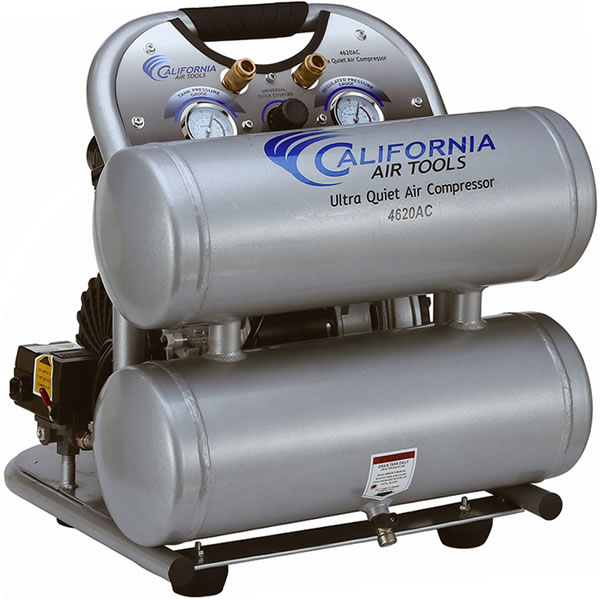
By far the most common compressor type is a reciprocating piston pump. These are straightforward pumps that use the same piston you would see in an engine that rotates in a chamber to compress air.
They move up and down rapidly to capture air that is in proportion to the size of the piston itself.
Single-piston models tend to be noisier than dual-piston (also called duplex) reciprocating air compressors.
Duplex compressors, like ones from California Air Tools, produce less noise, because they produce more air with fewer revolutions, have tighter tolerances, and allow for better cooling. Other features to look for in low-noise reciprocating air compressors include: low RPM, ASME certified tanks, cast iron cylinders, and compressors that come equipped with an aftercooler.
Rotary Screw
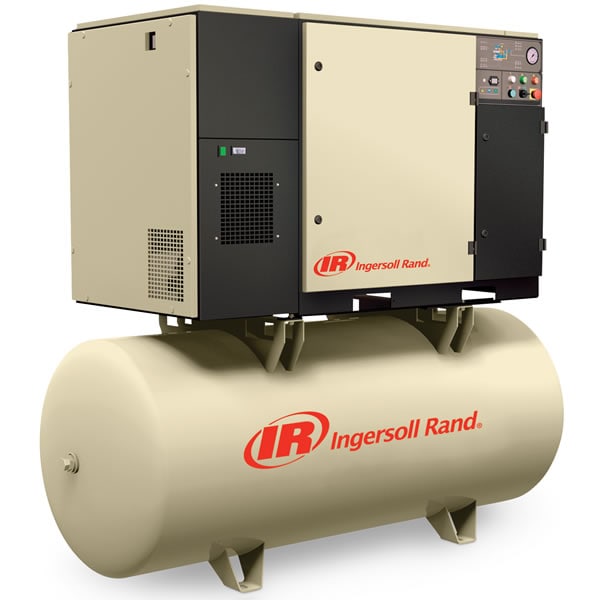
Rotary screw air compressors are much quieter than reciprocating compressors. They feature a positive displacement compression system that includes a pair of matching helical screws. It's similar (in design) to a turbocharger that sticks out of the hood of a hot-rod.
Oil-injected types are more common and less-expensive than oil-free models. Although oil-free compressors are more expensive up-front and costlier to maintain, they are far superior in quality and are required in the medical and food industries.
What makes rotary screw compressors so quiet is the fact that the helical screws don't actually touch one another. A huge benefit of rotary screw compressors is that they can be mounted close to workspaces without requiring hearing protection.
For instance, Atlas Copco's VSD+ line of air compressors are so quiet they only produce 62 decibels!
Scroll
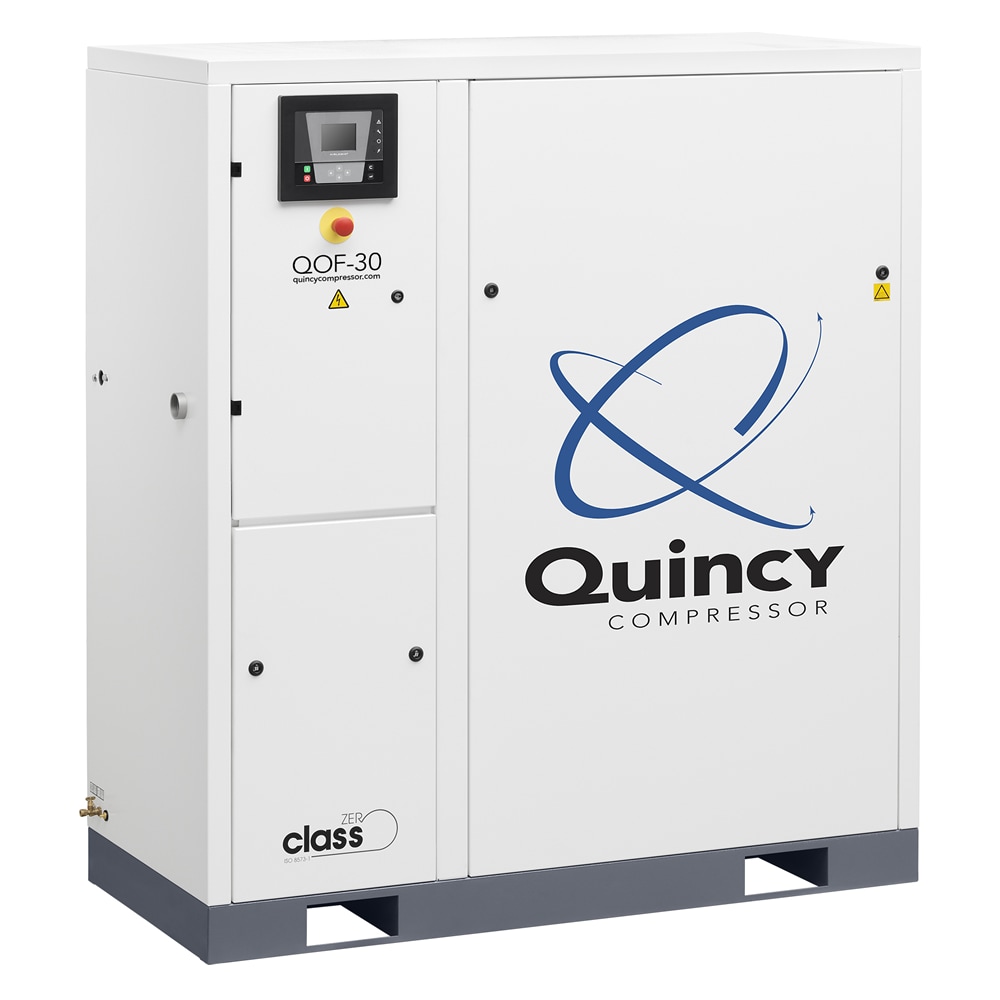
The most exceptionally quiet and efficient air compressor is the scroll air compressor. Scroll air compressors use two spiral-shaped metal pieces to compress the air. One piece is stationary, while the other fits inside and moves in a circular motion, creating compression.
Scroll compressors are designed to run continuously and are ideal for many commercial applications, such as medical, pharmaceutical, food, laboratory, textile, electronics, and production facilities.
Although they are designed to run continuously all day long, their only drawback is their limited CFM capacity. A heavy-duty scroll compressor is the way to go anywhere unlimited, quiet, and clean air is required.
Quiet Air Compressor FAQ's
How do I make my air compressor quieter?
As you learned above, there are a few factors, components, and features built into compressors to make them quieter out of the gate, like rubber components, proximity to the job, or sound-dampening technology.
However, there are other options to consider, such as placing a rubber mat underneath the compressor to reduce floor vibrations. You could also replace the base plugs with rubber grommets if they aren't already there.
Some people try using automotive soundproofing foil to size, cut, and place in specific locations around the motor to make it quieter from the inside, but if you choose to do this, you need to be sure the foil is not placed anywhere where electrical or heating problems may be caused. There are also many different aftermarket parts you could research to see if they would help make your compressor quieter, such as an intake silencer.
If your compressor is in a corner, you could consider using a sound blanket for on-wall dampening and echo reduction.
What is an air compressor muffler?
Similar to how a car muffler functions, some people outfit a muffler, and heavy-duty air hoses to dampen the sound on your compressor's intake. This is a DIY-type modification and we do not recommend attempting to outfit a used car muffler on your compressor.
A car muffler traps carbon over time, and it would not be a good thing to have that carbon make its way through your compressor when attached to your intake. If you are buying a new air compressor, we recommend paying a little more for the quieter option that has a feature like this built-in by the manufacturer.
Building a DIY soundproof enclosure
Similar to the muffler question, many people research and discover they can make a DIY soundproof enclosure to place their compressor in to reduce on-site noise. This is also in DIY territory and there are no standardized instructions on how to create a safe enclosure for your compressor.
Air Compressor Buyer’s Guide Navigation
Ultimate Compressor Guide | Air Compressors 101 | For Homeowners | For Contractors | Stationary Compressors | Portable Compressors | Quiet Compressors | Energy Efficiency | Air Treatment Systems | Air Filters 101 | Air Tools 101 |



![Top 3 Best Quiet Air Compressors of 2025 [Expert-Picked]](https://www.aircompressorsdirect.com/article-image/334/social_img_1639_7c7d24ccbefc3abff9bcce2fee950566.png)

